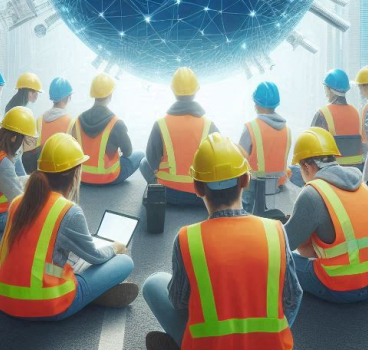Future of construction and Blockchain Technology
The construction industry, long known for its traditional practices, is undergoing a transformative shift driven by technological advancements. Among these innovations, blockchain technology stands out as a game-changer with the potential to streamline processes, enhance transparency, and foster collaboration across the entire construction ecosystem write John Ridgeway.
Blockchain, is a decentralised and secure ledger system underpinning cryptocurrencies like Bitcoin and offers a unique solution to the challenges faced by the construction industry. By providing an immutable and tamper-proof record of transactions and data, blockchain has the potential to revolutionise the way projects are managed, payments are processed, and information is shared.
In the construction industry, supply chains are often complex and fragmented, making it difficult to track materials, components, and labour. Blockchain can address this issue by creating a transparent and traceable record of every transaction throughout the project lifecycle. This enhanced visibility can help prevent fraud, ensure compliance with regulations, and improve quality control.
Blockchain can streamline project management by providing a single, shared platform for managing project documents, contracts, and communication. This can eliminate the need for multiple copies of documents, reduce the risk of errors, and improve collaboration among stakeholders.
It can also be shown that Blockchain can facilitate secure and efficient payments by automating payment processes and reducing the risk of fraud. Smart contracts, self-executing contracts embedded in the blockchain, can automatically trigger payments based on predefined conditions, such as the completion of milestones or the delivery of materials. This can eliminate the need for manual reconciliation and reduce the risk of disputes.
It means that Blockchain can empower sustainable practices in construction by providing a transparent record of the environmental impact of materials and processes. This can help construction companies make informed decisions about the materials they use and the methods they employ, reducing their environmental footprint.
The potential of blockchain technology in construction is already being realised through various pilot projects and initiatives worldwide. Here are a few examples:
- BIMchain: A platform that integrates blockchain with Building Information Modeling (BIM) to provide a single source of truth for project data.
- Provenance: A platform that tracks the origin and movement of materials throughout the supply chain, ensuring authenticity and sustainability.
- Evercity: A platform that uses blockchain to manage smart contracts and payments for construction projects, reducing paperwork and streamlining processes.
Despite its immense potential, blockchain technology faces challenges in its adoption within the construction industry. These challenges include:
- Standardisation: The lack of standardised protocols and frameworks for blockchain implementation can and will hinder widespread adoption in the short term.
- Integration: Integrating blockchain with existing systems and processes can also be complex and costly.
- Education and Awareness: Raising awareness among industry stakeholders about the benefits and applications of blockchain is also crucial for its adoption.
As the technology matures and standardisation efforts progress, we can expect to see Blockchain play an increasingly significant role in transforming the construction industry.
But by addressing the challenges and harnessing the power of Blockchain, the construction industry can move towards a more efficient, transparent, and sustainable future – we at Talk.Build will keep you up to date with progress.
Additional Blogs

Are apprenticeships a real investment in skills or just cheap labour?
Spend any time in the construction sector and you’ll hear the same two conversations running in parallel. The first is about the skills shortage with ageing trades, retirements outpacing recruitment,...
Read moreShould governments subsidise modular construction to solve the housing crisis?
There’s something deeply uncomfortable about the way we talk about the housing crisis in Britain. We describe it as “chronic”, “systemic”, “complex”. We commission reviews. We announce targets. We...
Read more

Do BREEAM and LEED really make buildings better?
Walk into the reception of any new office block and you’ll usually see it, framed proudly behind the desk - a certificate, stating BREEAM Excellent or LEED Gold - sometimes Platinum, if the developer...
Read more